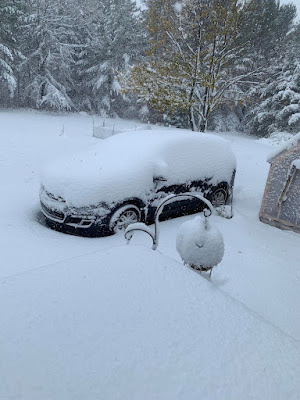 |
| The scene in Gwinn, Michigan yesterday after 13 inches of early snow. Photo by Mindy Olvera via MLive. |
Yesterday, snow fell as far south as the Kentucky/Tennessee border. Up to 18 inches of snow buried some spots in Michigan's Upper Peninsula. In northern Indiana, up to four inches of snow combined with wind gusts of over 40 mph brought down tree limbs that are still in leaf.
Widespread freezes damaged crops remaining autumn crops across the South. Freeze warnings were in effect all the way down to the Gulf Coast in Mississippi and Alabama.
Yesterday, Omaha, Nebraska reached 16 degrees, easily the coldest for so early in the season. Same story this morning in Springfield, Missouri, where the 21 degree reading was also the coldest for so early in autumn.
Birmingham, Alabama reached 32 degrees this morning, so they received their earliest freeze on record. Birmingham had a freeze earlier this autumn than in normally chilly places like Billings, Montana and Burlington, Vermont.
Even some single digit temperatures showed up. It was 7 degrees in Spencer, Iowa yesterday and 9 degrees in Huron, South Dakota.
Daytimes have been cold, too. In Atlanta, Georgia, the high temperature Tuesday was 54 degrees, which is the normal high temperature there in January. And, again, it was colder than Burlington, Vermont's Tuesday high of 58 degrees).
The shot of cold air was directed from north of the Arctic Circle right down into the middle of the nation. Since the main push of cold went by to the west of Vermont, we are escaping the worst of it. Temperatures will be a little cooler than average in the Green Mountain State for the next couple of days, but it's nothing out of the ordinary for October.
Overall, the weather pattern is changing so that by the end of the week, much warmer air will envelop the big freeze zone. That warmer air will come into Vermont starting this weekend.
For you wags out there saying "whatever happened to global warming?" do note that as usual, most of the world is experiencing above normal temperatures. An intense old wave in one corner of the world does not "cancel" climate change.

No comments:
Post a Comment